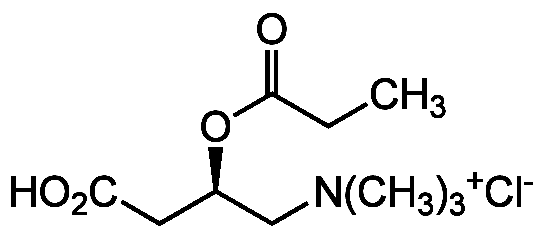Propionyl-L-carnitine . hydrochloride
Naturally occurring carnitine derivative formed by carnitine acetyltransferase during beta-oxidation of uneven chain fatty acids, with high affinity for muscular carnitine transferase. Increases cellular carnitine content, allowing free fatty acid transport into the mitochondria. Stimulates energy production in ischaemic muscles by increasing citric acid cycle flux and stimulating pyruvate dehydrogenase activity. Important for mitochondrial metabolism and energy regulation. Regulates the metabolism of both carbohydrates and lipids, leading to an increase of ATP generation. Selectively inhibits in vitro and ex vivo platelet-activating factor (PAF) synthesis from human neutrophils. Antioxidant. Shows free radical scavenging activity. Decreases the expression of inducible nitric oxide synthase (iNOS/NOS II) and NADPH-oxidase 4-mediated reactive oxygen species production in human umbilical vascular endothelial cells. Shows beneficial cardiovascular effects. Improves body weight, food intake, adiposity and insulin resistance in Type 2 diabetes. Stimulates endothelial nitric oxide (eNOS/NOS III) and increased NO production, via AMPK/Src-mediated signaling that leads to activation of PI3 kinase and Akt.

| Catalog Number | AG-CR1-3595-M100 |
| Alternative Name(s) | PLC |
| Research Area | Biochemicals, Metabolism, Obesity |
| Molecular Formula | C10H19NO4 . HCl |
| CAS# | 119793-66-7 |
| Purity | >98% |
| Inchi | InChI=1S/C10H19NO4.ClH/c1-5-10(14)15-8(6-9(12)13)7-11(2,3)4;/h8H,5-7H2,1-4H3;1H/t8-;/m1./s1 |
| Inchi Key | KTFMPDDJYRFWQE-DDWIOCJRSA-N |
| SMILES | CC[C@@H](CC(O)=O)OC(=O)CC |
| Size | 100 mg |
| Supplier Page | http://www.adipogen.com/ag-cr1-3595/propionyl-l-carnitine-hcl.html |

